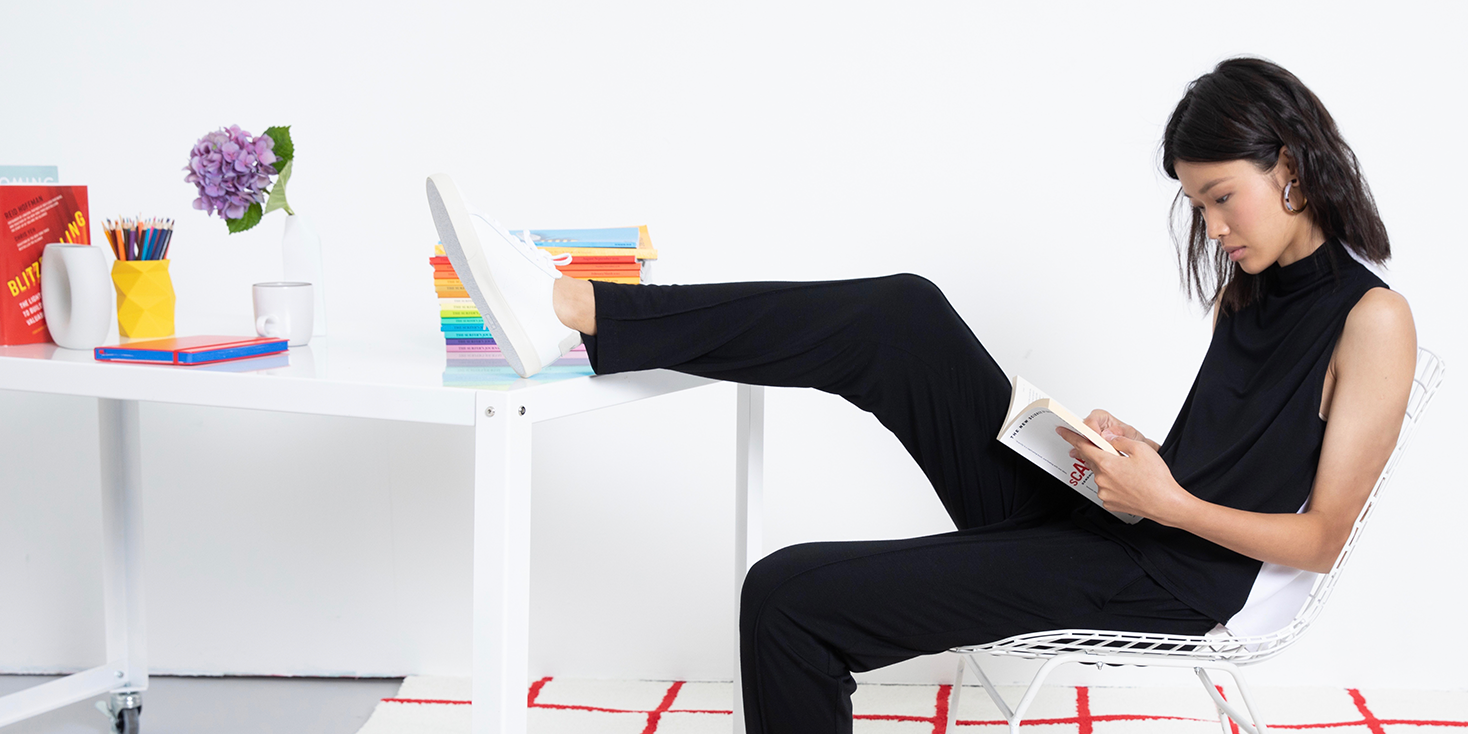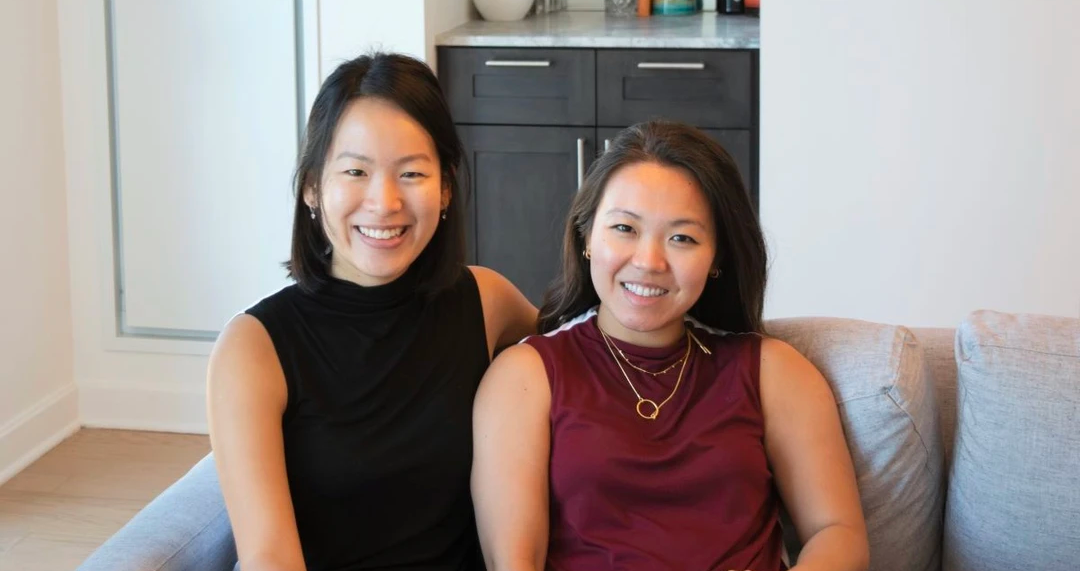
How Pairess is disrupting fashion
The founders of Pairess say their startup is about more than creating fashionable clothes. They want women to feel inspired to “shatter their goals and break the glass ceiling.”
Amy Jiang and Showly Wang (seated left and right in photo below) co-founded Pairess in 2019—after they became friends while working at Affirm. Their earlier jobs laid a foundation for entrepreneurship and united them in purpose: to give customers “more time, energy, and mindshare for the things that matter instead of worrying about what to wear.”
At Affirm, we’re proud to count Pairess as one of our retail partners. This Q&A with Amy and Showly explores more about their brand’s origin, mission, and unique impact—on both the fashion industry and today’s culture.
Tom Musbach: Let’s start with your professional journeys. How do you connect the dots from being a former Affirmer to fashion entrepreneur?
Amy Jiang: I have a pretty atypical background for a fashion entrepreneur. I studied statistics at Harvard, worked in management consulting, and then joined the strategy & analytics team at Affirm. But the seed for Pairess was planted when I worked in consulting and struggled to find stylish, functional clothes for work. My clothes were uncomfortable, dry-clean only, and didn’t have pockets. As someone who was working 80-hour weeks, I was frustrated that my clothes demanded so much of my time and mindshare.
But I never would have started Pairess had I not met Showly at Affirm. We were working pretty closely together on a project and bonded over our shared frustration on the lack of pockets in women's clothing. A shared complaint turned into an idea, which turned into a side project, which turned into Pairess.
Showly Wang: I’ve always been passionate about fashion and solving problems within retail and e-commerce. Before joining Affirm, I had work experiences at Neiman Marcus, Stitch Fix, and Oscar de la Renta, where I learned the ins and outs of the fashion industry in established, structured environments. I didn't envision becoming an entrepreneur until my time at Affirm, where I worked on omnichannel product and partnerships, a new market for Affirm at the time. The experience helped me develop an entrepreneurial spirit and skillset. I was excited to create something new that I really believed in and learned how to be speedy, resourceful, and gritty. All of these experiences combined allowed me to take the leap in founding my own fashion startup.

Where did the name Pairess come from, and what’s the mission behind your brand?
AJ: Pairess is a portmanteau of “pair of pants and a dress,” two key wardrobe staples that women choose between each day.
Our mission is to help women succeed professionally with stylish apparel that’s also functional. We strive to give women more time, energy, and mindshare for the things that matter—like breaking glass ceilings—instead of worrying about what to wear. From Day 1 it was important to us to build more than just a clothing company.
That’s a powerful mission. What are some of the ways you’re achieving it?
SW: When women think of Pairess, we want them to feel inspired to shatter their goals and break the glass ceiling. We do this through our business partnerships, philanthropic partnerships, and the stories we tell.
Business partnerships: We’re committed to working with women-owned partners and freelancers wherever possible. Today, a majority of our supply chain partners are women-owned.
Philanthropic partnerships: We donate 1% of sales year-round to organizations that help advance girls. For Women’s History Month in March, we’re donating 10% of sales instead of the usual 1% to Step Up, an organization that helps girls in underserved communities develop leadership skills.
Messaging & storytelling: We name every product after trailblazing women and tell their stories. For example, our Patsy pants are named after Patsy Mink, the first Asian-American and woman of color elected to Congress.
How is your brand influencing the fashion industry?
AJ: We’re disrupting the industry standard of designing women’s clothes for style only. We’re showing other brands and retailers that it is possible to have something that looks good and is also functional. Equally as important, we’re raising the standard of what women expect in their clothes. Many of our customers have reached out to let us know that they no longer put up with pocketless, high-maintenance, uncomfortable clothing.
SW: The reaction has been overwhelmingly positive, and we think it’s because so many women can relate to the same frustrations (clothing and more) that we had when we worked in demanding corporate jobs. Our customers share our values of supporting women to succeed. The top feedback we hear from customers in interviews and surveys—aside from our clothes being stylish and comfortable—is that they purchased from Pairess to support a female-founded, women-first brand.
Why did you partner with Affirm to offer your customers a way to pay over time?
AJ: It’s important to us that our clothes be as accessible as possible, so that finances aren’t a deterrent to a great wardrobe. This means revisiting our supply chain contracts and operating margins to see if there are any opportunities to lower the cost of our garments. It also means providing customers with a flexible payment option. Affirm is the best provider for this, providing value and a superior experience to both merchants and shoppers.
Whatstood out to you about doing business during the pandemic?
SW: Luckily, the pandemic has made our core value proposition more relevant, as women are even less willing to compromise on comfort while at home. But we had to pivot our product to meet the opportunity.
We had plans to launch an office wear capsule in April 2020, but when the pandemic hit, office wear became irrelevant for the foreseeable future. While our supply chain partners were shut down, we surveyed women and learned what they were looking for in their new work-from-home wardrobes. We saw the opportunity for a “work-from-anywhere” wardrobe of chic loungewear, tops for Zoom, and polished pants that felt like pajamas—all of which can be worn inside and outside the home. When our partners safely reopened in June, we restarted parts of the design process to create this capsule, sourced new fabric, designed a loungeset, and turned our office dresses into tops.
AJ: The pandemic forced us to make many business decisions that ended up benefiting Pairess and that we may not have made otherwise. For example, we couldn’t have photo shoots in indoor spaces in New York City with your typical large crew (photographer, assistant, hair and makeup artist, models, stylist, etc.). So we started collecting user-generated content and doing at-home shoots with one person behind the camera and one person wearing our clothes. These images have become a big part of our brand.
Consumers have loved seeing our clothes on a variety of women, and it’s certainly more cost-effective to do a two-person apartment shoot. These are practices we’ll continue to do even post-pandemic. As challenging as running a business in the pandemic has been, we’re kind of grateful that it’s forced us to be even more creative. It’s all about perspective.




